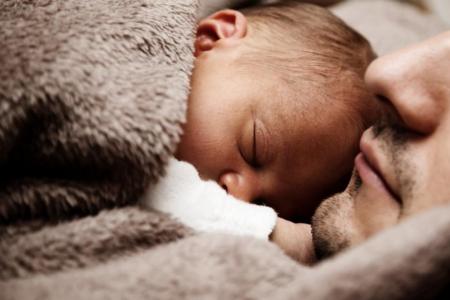Bed-sharing raises risk of Sudden Infant Death Syndrome: Experts
Experts weigh in on online debate over sleeping arrangement for infants
The debate over whether parents should share beds with infants was ignited online, following the death of a 36-day-old baby last Tuesday.
Her parents discovered that she was not breathing after she spent the night on their bed.
She was taken to KK Women's and Children's Hospital (KKH) but was pronounced dead soon after. Police investigations are ongoing.
In most cases, it can be difficult to ascertain whether a sleep-related infant death is caused by Sudden Infant Death Syndrome (Sids) or accidental suffocation even with an autopsy, said Dr Michael Lim, a consultant at National University Hospital (NUH).
Sids is an unexplained infant death resulting from an unknown cause, and Dr Lim said NUH sees a "small" number of such cases.
"There is little published local data, although there was one published paper from 1996, where one can infer there were about 30 deaths from Sids over a five-year period here, from 1989 to 1993," he said.
The topic of bed-sharing has long been a source of debate on parenting forums.
Local paediatricians The Straits Times spoke to said young infants should not share a bed with their parents.
Dr Lim said bed-sharing puts infants less than four months old or born premature at risk of suffocation, strangulation and Sids.
The risks from bed-sharing far outweigh any perceived benefits.Dr Anita Menon
KKH's Dr Arun Kumar Pugalenthi said that studies have shown that bed-sharing is associated with a five-fold increase in the risk of Sids in the first three months of a baby's life, as compared to infants sleeping in a supine position in a cot in the parents' room.
He said: "Currently, there is insufficient evidence to recommend any bed-sharing situation as safe."
Dr Anita Menon, who is in private practice, said: "There are some parents who share their bed with their baby as they feel that it is easier to feed the baby during the night... However, the risks from bed-sharing far outweigh any perceived benefits."
Dr Lim said there are ways to minimise risks involved in bed-sharing. It includes sleeping on a firm mattress, ensuring the infant is not overdressed and removing pillows, comforters and soft items from the bed.
Parents who practise bed-sharing told ST they chose the arrangement as it allows them to feel physically and emotionally closer to the child.
Mrs Petrina Pang's two children both shared a king-sized mattress with her and her husband until they turned three.
The 36-year-old accounts executive, whose children are now aged five and nine, said she did her research before deciding that bed-sharing was suitable for her family.
She also took precautions to reduce the risk of incidents.
"It can be done safely. I understood the risk of Sids, and I also realised that having them sleep on their own has its risks as well."
Besides making it easier to monitor the infant and breastfeed, mothers said they feel bed-sharing helps their babies to feel more secure.
But mothers who believe in separate sleeping surfaces feel that the arrangement helps the child become independent.
Madam Genevieve Foo, 53, said she chose to have her two children sleep in a cot when they were young, not out of fear of bed-sharing.
"We have never shared a bed with our children, we always chose to have our baby sleep in a separate cot at night.
"I do not think sleeping with parents on the same bed is good, sleeping separately helps them build character and independence."
Get The New Paper on your phone with the free TNP app. Download from the Apple App Store or Google Play Store now



